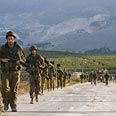
Enlightened or unhinged?
Left-wing intellectual bankruptcy has left us unwilling to truly fight the enemy
Amos Oz in "Try a Little Tenderness" (Interview) Ha'aretz, March 17, 2000
We are tired of fighting, we are tired of being courageous, we are tired of winning, we are tired of defeating our enemies, we want that we will be able to live in an entirely different environment of relations with our enemies.
Ehud Olmert Address at Israel Policy Forum, New York, June 9, 2005
Anyone wishing to understand how Israel was led (or rather misled) into the lamentable predicament it finds now itself, need look no further than the foregoing citations. These epitomize the malaise that has afflicted Israel's national fabric for the last two decades – and whose bitter fruits we are now reaping.
The first citation encapsulates the feebleness of mind and failure of judgment of the bon-ton addicts who form the elite of Israel's civil society and who have set the tone of public debate in the country since the 1980s. The second reflects the feebleness of spirit and failure of leadership that has characterized the Israeli polity over the past quarter-century, and allowed the nation to be swept away in torrent of politically-correct drivel.
As a result the country is now confronted with a dismal situation in which the IDF, purportedly the strongest military force in the region, equipped with the most advanced armaments on land, sea and air, is patently unable to neutralize a tiny paramilitary organization, numbering several thousand at most, without a single aircraft, tank or battleship at its disposal.
Million refugees
Over a million Israeli civilians have been forced to flee their homes or to cower in bomb shelters; commercial and industrial activity in large portions of the country have ground to a halt, and humanitarian suffering has began to reach alarming levels.
The ongoing fiasco is all the more inexcusable, and government's inadequate, incompetent response to it all the more inexplicable, in light of the fact there was virtually nothing unpredictable about the development of the recent crisis. It was common knowledge that the Hizbullah had amassed 14,000 rockets and missiles. Assuming the Israeli government didn't assume this arsenal had been accumulated for merely ceremonial purposes, how did it plan to contend with this clearly discernable threat?
The extent of danger posed by the Hizbullah weaponry could readily have been assessed. For even we assumed that at least 90 percent of it was ineffective – because of inaccurate launchers, dud inventory, destruction of stockpiles and/or launchers by the IDF – this still would mean several hundreds - possibly up to a thousand - civilian casualties, enormous physical devastation and colossal economic cost.
Some strategy
But as the days have turned into weeks, now it's a month, it has become alarmingly clear that the Olmert administration had no effective plan to protect its citizens – even against a small group of irregulars.
The fact no such plan of decisive action was formulated to deal with so foreseeable a crisis is a grave dereliction of responsibility by the Israeli leadership. Indeed, as the conflict drags on one may be excused for thinking Olmert's master strategy is to let Hizbullah bombing until it runs out of ammunition.
One hardly needed to be a military expert to realize that neutralizing Hizbullah would require massive deployment of ground forces. Even if the inexperience of the current political leadership could be considered a mitigating factor in the initial days of the fighting, it soon became clear - as Hizbullah attacks continued unabated - that the exclusive reliance on airpower was ineffectual.
The hesitant use of limited ground force – predictably - did little or nothing to bring about a perceptible change in the patterns of the daily barrages raining down on Israeli towns and villages. Yet, in spite of an unprecedented, benign international environment, the government stubbornly refused to recognize the military imperatives of the situation - and the long-term strategic costs of that refusal.
Psychological prisoner
Olmert, still tied to the notion of unilateral withdrawal that brought him to power, has proven unable to free himself from the psychological stranglehold of the perverse constraints and taboos that Israel's intellectually corrupt elites have imposed on the public debate.
Constrained by the false axioms they inculcated into the discourse, Olmert found himself imprisoned within the confines of the distorted intellectual architecture that precluded any possibility of effective policy responses to a reality that made his election platform look absurd.
As the government dithered, its weakness and hesitancy began to take heavy toll on a range of vital national interests – degrading Israel's deterrent posture in the Arab world, eroding the Arab fear of the consequences of attack on Israel's civilian population centers and infrastructure; accumulating diplomatic damage via continual bombing of Lebanon which did little to quell the deluge of rockets on Israeli civilians, but much to stir up international condemnation; fomenting growing anger across the Moslem world – and hence pressure - on regimes that tacitly endorsed a swift crushing of Hizbullah; and perhaps most disturbingly, undermining the US perception of Israel's military prowess and hence of its value as an ally.
Only now, a month into the fighting, and coerced only by failure rather than guided by wisdom, has his government began to seriously consider a wider ground offensive which could have brought hostilities to a close much – possibly weeks – earlier.
When the current fighting ends, the nation will have to conduct a soul-searching reevaluation of the criteria that determine who is fit to lead it into the future and what the principles are that should shape that future. For the continued survival of the Jewish nation-state, such a re-evaluation is imperative.










